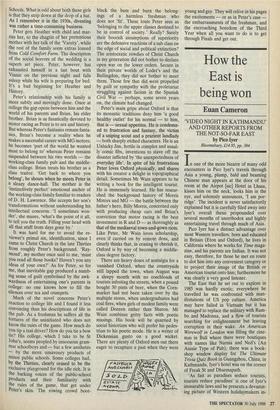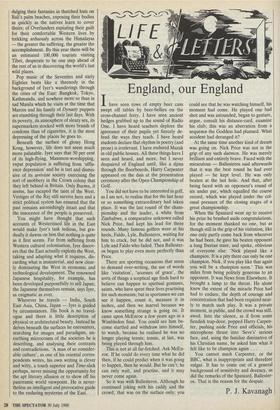How the East is being won
Euan Cameron
`VIDEO NIGHT IN KATHMANDU' AND OTHER REPORTS FROM THE NOT-SO-FAR EAST by Pico Iyer
Bloomsbury, £14.95, pp. 384
In one of the more bizarre of many odd encounters in Pico Iyer's travels through Asia a young, plump, bald and beaming Chinese man appears at the door of his room at the Airpot [sic] Hotel in Lhasa, kisses him on the neck, looks him in the eye, and solemnly announces, 'I am por- ridge'. The incident is never satisfactorily explained but it is carefully filed away into Iyer's overall thesis propounded over several months of unorthodox and highly entertaining travel through much of Asia.
Pico Iyer has a distinct advantage over most Western travellers: born and educated in Britain (Eton and Oxford), he lives in California where he works for Time maga- zine, and his parents are Indian. It was not easy, therefore, for those he met en route to slot him into any convenient category or to project their image of the British or American tourist onto him; furthermore he was clearly a very good listener.
The East that he set out to explore in 1985 was hardly exotic; everywhere he travelled he was confronted with man- ifestations of US pop culture. America may have failed in Vietnam but it has managed to replace the military with Ram- bo and Madonna, and a flow of tourists searching for enlightenment but leaving corruption in their wake. An American Werewolf in London was filling the cine- mas in Bali where there were boutiques with names like Narnia and Ned's (An Aussie Type of Pub); there was a book- shop window display for The Ultimate Trivia Quiz Book in Guangzhou, China; in Kathmandu, Iyer's hotel was on the corner of Freak St and Dharmapath.
`As fast as paradises seduce tourists, tourists reduce paradises' is one of Iyer's immutable laws and he presents a devastat- ing picture of Western holidaymakers in- dulging their fantasies in thatched huts on Bali's palm beaches, exposing their bodies as quickly as the natives learn to cover theirs; of Overlanders expiating their guilt for their comfortable Western lives by trekking arduously across the Himalayas — the greater the suffering, the greater the accomplishment. By this year there will be an estimated 100,000 tourists visiting Tibet, desperate to be one step ahead of the rest of us in discovering the world's last wild places.
Pop music of the Seventies and early Eighties beats like a threnody in the background of Iyer's wanderings through the cities of the East: Bangkok, Tokyo, Kathmandu, and nowhere more so than in sad Manila which he visits at the time that Marcos and his family of Dynasty puppets are stumbling through their last days. With its poverty, its atmosphere of sleazy sex, its supermarkets stocked with more brands of condoms than of cigarettes, it is the most depressing of the places he goes to.
Beneath the surface of glossy Hong Kong, however, life does not seem much more palatable. Iyer says that 50 per cent of its high-flying, Mammon-worshipping, expat population is suffering from 'afflu- ence depression' and he is tart and dismis- sive of its arriviste society exercising the sort of snobbery in the Crown colony that they left behind in Britain. Only Burma, it seems, has escaped the taint of the West. Vestiges of the Raj still survive here and a strict political system has ensured that the past remains astonishingly intact and that the innocence of the people is preserved.
You might have thought that such accounts of Westernised life in the East would make Iyer's task tedious, but gra- dually it dawns on him that nothing is quite as it first seems. Far from suffering from Western cultural colonisation, Iyer discov- ers that the East actually exploits the West, taking and adapting what it requires, dis- carding what is immaterial, and now clear- ly dominating the West in economic and technological development. The renowned Japanese hospitality, for example, has been developed purposefully to sell Japan; the Japanese themselves remain, says Iyer, as enigmatic as ever.
Wherever he travels — India, South East Asia, China, Japan — Iyer is guided by circumstances. His book is no travel- ogue and there is little description of physical or architectural beauty. Instead he delves beneath the surfaces he encounters, searching for images and paradigms, un- earthing microcosms of the societies he is describing, and analysing their contrasts and contradictions. 'A man of so consider- able culture', as one of his oriental corres- pondents writes, his own writing is clever and witty, a touch superior and Time-slick perhaps, never missing the opportunity for the apt literary allusion or to show off his panoramic world viewpoint. He is never- theless an intelligent and provocative guide to the enduring mysteries of the East.















































 Previous page
Previous page